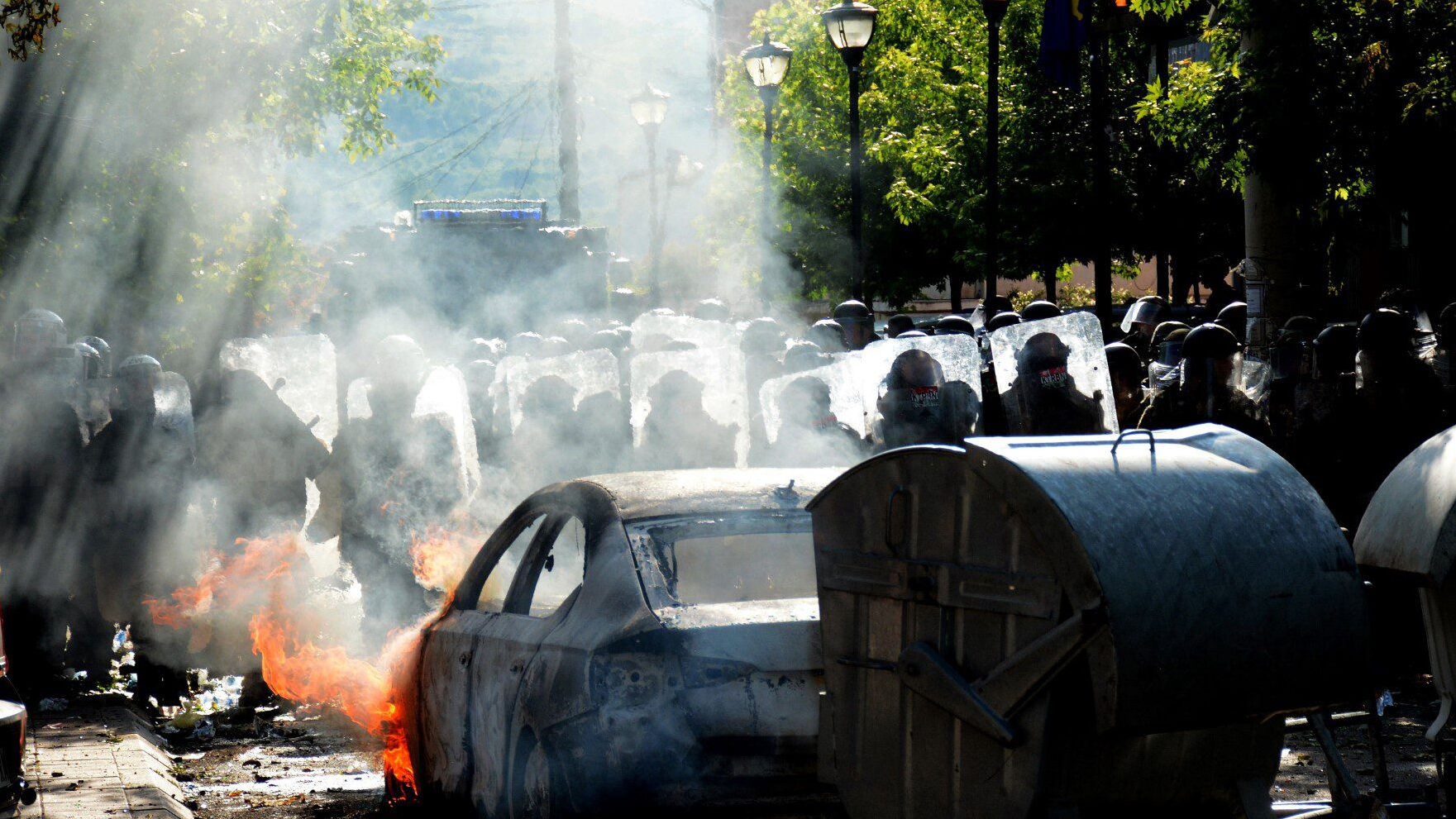
Kosovo riot police and KFOR (International Military Mission to Kosovo) military police secure entrance to the municipal building in Zvečan, northern Kosovo on May 29th, 2023, following clashes with Serb protesters demanding the removal of recently elected Albanian mayors.
Photo: AFP
Tensions in Serb-majority northern Kosovo flared on Monday afternoon, May 29th, as local Serbs clashed with NATO peacekeepers. In four northern municipalities, ethnic Serbs protested the fact that ethnic Albanian mayors started assuming their duties there.
Serbia does not recognize Kosovo’s independence, which it declared in 2008, and considers it one of its provinces. Last month, Serbs boycotted local elections which, despite a 3.5% turnout, granted ethnic Albanian candidates the mayoralties in all four Serb-majority municipalities. As a result, these new mayors are deemed illegitimate by local Serbs.
Northern Serbs have long demanded that an EU-brokered 2013 deal for the creation of autonomous municipalities in the area be implemented. The Serbs, numbering 120,000, are an ethnic minority in Kosovo, which has a total population of 1.8 million.
In the municipality of Zvečan, which lies 45 kilometers from Kosovo’s capital of Pristina, fierce scuffles broke out between Serb protesters and Kosovo Force soldiers (KFOR), the NATO-led peacekeeping force in the region. It is the most severe violent incident of its kind that Kosovo has witnessed in years.
According to KFOR’s version of the events, protesters forcefully tried to enter Zvečan’s town hall. To protect the Albanian representatives and disperse the crowd, NATO soldiers subsequently fired tear gas into it.
The Serbs threw back tear gas grenades as they pelted NATO forces with stones and other objects. Some hand-to-hand fighting also occurred. In the melee, vehicles were vandalized and set on fire.
International media reports that 52 Serb protesters were injured.
A KFOR press release states that 30 of its soldiers—eleven from the Italian and 19 from the Hungarian contingent—sustained multiple injuries. In addition to fractures, KFOR claims some soldiers had sustained burns from “improvised explosive incendiary devices.” Three other Hungarian soldiers were wounded after having come under gunfire. None of these wounds were life-threatening.
Dramatic footage from the streets of Zvecan by @evropaelire. Kosovo police confirms five people were arrested, while at least 41 @NATO_KFOR soldiers were injured, most of them Italian and Hungarian troops. pic.twitter.com/GIM31Ue51y
— Marija Ristić (@Marien__R) May 29, 2023
Other than two car windshields belonging to media outlets being smashed, on Tuesday, May 30th, the mood in Zvečan is largely calm, with KFOR soldiers still standing guard outside its town hall.
While 3,800 KFOR soldiers are on active duty in Kosovo, they are rarely deployed. In a statement, NATO announced it will send additional forces to Kosovo to curb the violence, adding it “has directed the deployment of the Operational Reserve Forces (ORF) for the Western Balkans.”
The EU’s top diplomat Josep Borrell has since condemned the “violent acts committed against KFOR troops, media, civilians and police,” which the EU finds “absolutely unacceptable.”
The block, he added, urges Kosovo authorities and protesters to “immediately and unconditionally de-escalate the situation.”
The EU condemns today’s shocking violence in #Zvecan in the strongest possible terms.
— Josep Borrell Fontelles (@JosepBorrellF) May 29, 2023
The violent acts committed against @NATO_KFOR troops, media, civilians and police are absolutely unacceptable.
1/2
The EU urges Kosovo authorities and the protesters to immediately and unconditionally de-escalate the situation.
— Josep Borrell Fontelles (@JosepBorrellF) May 29, 2023
We expect the Parties to act responsibly and find a political solution through the Dialogue immediately.
2/2
At a specially convened press conference on Monday evening, Serbian President Aleksandar Vučić condemned that day’s violence in the strongest of terms, as he accused Kosovo’s Prime Minister Albert Kurti of desiring a “big conflict between the Serbs and NATO, while he, the sole culprit for everything that is going on, would wash his hands like Pilate and say it has nothing to do with him.”
He added that KFOR troops had let the “false” mayors of the municipalities enter the buildings to protect them against the Serbs, instead of doing the opposite.
“The opposite thing they should have done would have been in line with statements by the Quint [an informal decision-making group consisting of the U.S, France, Germany, Italy, and the UK], the EU, the U.S. and everyone who says Kurti’s move of sending the so-called ethnic Albanian mayors to those buildings is illegal,” he said.
If the Quint states do not talk with Kurti, the Serbian leader said it would be “too late,” and while Belgrade “will do its best to preserve peace,” it will not allow “expulsions, pogroms or killings of our people in Kosovo-Metohija.”
On Tuesday, the head of the Serbian parliamentary committee on Kosovo-Metohija Milovan Drecun told Tanjug that Kurti had the support of all Quint states for his actions.
He said the destabilization of the north of Kosovo-Metohija was aimed at “pressuring Belgrade to accept an agreement in full, to minimize its strategic partnerships with Russia and China, to impose sanctions on Russia and completely turn to the West.”
Kosovo authorities however blame Belgrade for Kosovo’s current destabilization, as it had called on Kosovo Serbs to boycott northern Kosovo’s recent elections.
Commenting on the incident, Kosovo Prime Minister Albin Kurti tweeted late on Monday:
In a democracy there is no place for fascist violence—no appeal from ballot to bullet. Citizens of all ethnicities have a right to full and unencumbered service of their elected officials.
Spoke w/ 🇬🇧 SE Lord Stuart Peach about the outrageous attacks on Police, KFOR & journalists. In a democracy there is no place for fascist violence—no appeal from ballot to bullet. Citizens of all ethnicities have a right to full & unencumbered service of their elected officials.
— Albin Kurti (@albinkurti) May 29, 2023
Tensions had been running high since last Friday. Following clashes with ethnic Serbs and local police, Serbia put its army on its highest alert as it moved soldiers towards the Kosovo border.
